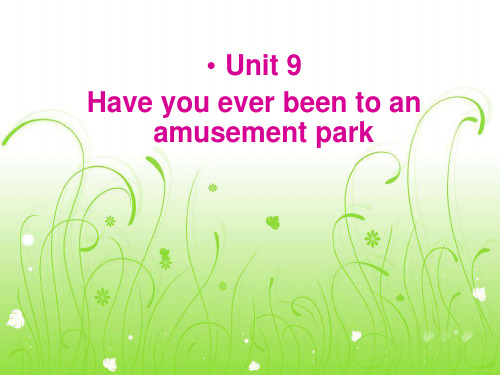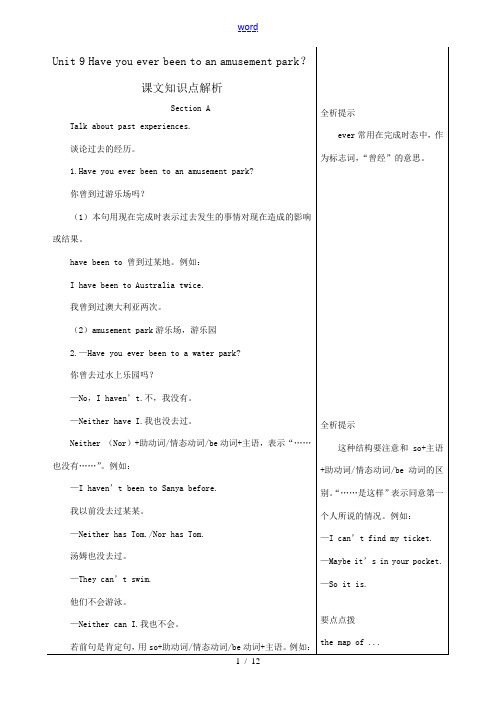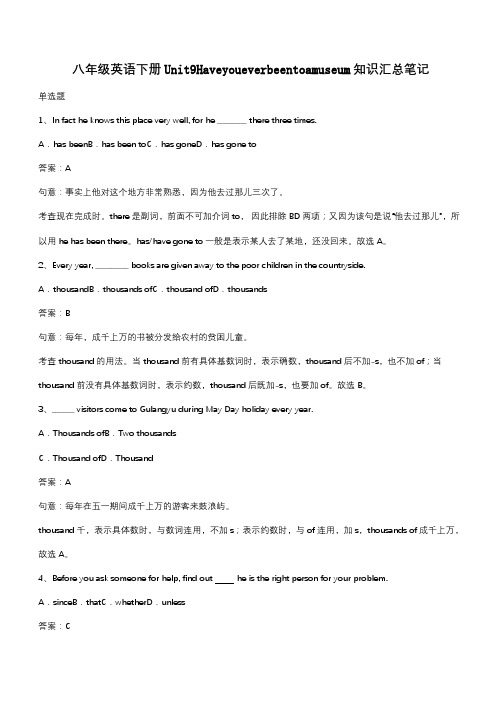人教版八年级下册英语Unit9 Have you ever been to a museum同步检测题及参考答案
- 格式:doc
- 大小:199.00 KB
- 文档页数:9


新目标八年级下册Unit 9 Have you ever been to a museum ?讲义一、重点单词1. amusement n. 娱乐; 游戏2. somewhere adv. 在某处; 到某处3. camera n. 照相机; 摄影机; 摄像机4. invention n. 发明物5. invent v. 发明; 创造1. unbelievable adj. 难以置信的; 不真实的2. progress n. 进步; 进展3. rapid adj. 迅速的; 快速的4. unusual adj. 特别的; 不寻常的5. toilet n. 坐便器; 厕所6. encourage v. 鼓励7. social adj. 社会的8. peaceful adj. 和平的; 安宁的9. performance n. 表演; 演出10. perfect adj. 完美的; 完全的11. itself pron.(it的反身代词) 它自己12. collect v. 收集; 采集13. German adj. 德国的; 德语的; 德国人的n. 德语; 德国人14. theme n. 主题15. ride n. 供乘骑的游乐设施; 短途旅程16. province n. 省份17. simply adv. 仅仅; 只; 不过18. fear v. & n. 害怕; 惧怕19. whether conj. 不管......;还是); 或者......(或者); 是否20. Indian adj.印度的 n. 印度人21. Japanese adj.;日本的; 日本人的; 日语的n. 日本人; 日语22. equator n. 赤道23. whenever conj. 在任何......时候; 无论何时24. spring n. 春天25. mostly adv. 主要地; 通常26. location n. 地点; 位置二、短语归纳1.at night在夜晚2.in a more natural environment在一个更加自然的环境中3.all year round 全年4.be far from 离……远5.in the dark 在黑暗中6.in the past 在过去7.have been to sp. 去过某地8.science museum 科学博物馆9.history museum 历史博物馆10.amusement park 游乐园11.go somewhere different 去不同的地方12.go skating 去滑冰13.take the subway 坐地铁14.a great way to spend a Saturday afternoon一个过周六下午的好方法15.all the old movie cameras所有的古老的电影摄影机16.learn about sth.解有关……的情况17.on the weekend 在周末18.camp in the mountains 在大山里露营19.put up a tent搭帐篷20.in such a rapid way 以如此迅猛的方式21.different kinds of各种各样的22.development of toilets 厕所的发展23.social groups 社会团体24.the tea art performances茶艺表演25.make a perfect cup of tea with beautiful tea sets用漂亮的茶具沏一杯完美的茶26.a nice place to enjoy tea 一个品茶的好地方27.thousands of 数以千计的28.International Museum of Toilets国际厕所博物馆29.the Terracotta Army 兵马俑30.Southeast Asia东南亚31.Night Safari 夜间动物园32.three quarters 四分之三33.an English-speaking country一个讲英语的国家34.have problem doing sth. 做某事很困难35.during the daytime在白天36.a couple of times 好几次37.right now 现在;目前38.an amusement park with a special theme一个有特别的主题的游乐园39.walk around the park 在公园里到处走40.hear of 听说41.take a ride兜风42.another province另一个省43.the Bird’s Nest鸟巢44.encourage sb. to do sth.鼓励某人做某事45.on the one hand... on the other hand.一方面,另一方面三、句型集萃1.a great way to do sth一个做某事的好办法2.It’s unbelievable that很难相信……3.watch sb do sth.看某人做了某事4.encourage sb to do sth鼓励某人做某事5.as..as和。



人教版英语八年级下册Unit 9《Have you ever been to a museum》教学设计一. 教材分析人教版英语八年级下册Unit 9《Have you ever been to a museum》主要讨论了人们参观博物馆、公园等地方的经历。
通过本节课的学习,学生能够掌握一般过去时的疑问句和回答,以及描述过去发生的事情。
教材中包含了丰富的图片、对话和练习,有助于激发学生的学习兴趣,提高他们的语言运用能力。
二. 学情分析八年级的学生已经掌握了一般现在时和一般过去时的基本用法,具备一定的听说读写能力。
但部分学生在实际运用中仍存在困难,如疑问句的构成、时态的运用等。
此外,学生的英语学习兴趣和动机有待提高。
三. 教学目标1.知识目标:–学会一般过去时的疑问句和回答;–掌握描述过去发生事情的句型;–了解博物馆、公园等地方的相关词汇。
2.能力目标:–能够用英语询问并描述别人过去的经历;–提高学生的听说读写能力。
3.情感目标:–培养学生对英语学习的兴趣;–培养学生热爱博物馆、公园等公共场所的意识。
四. 教学重难点•一般过去时的疑问句和回答;•描述过去发生事情的句型。
•疑问句的构成和时态的运用;•动词过去式的拼写规则。
五. 教学方法1.情境教学法:通过创设情境,让学生在实际语境中感受和运用英语;2.交际法:鼓励学生参与课堂互动,提高他们的口语表达能力;3.任务型教学法:通过完成任务,培养学生运用英语解决问题的能力;4.游戏教学法:通过趣味游戏,激发学生的学习兴趣。
六. 教学准备1.教学课件:制作课件,包含图片、动画、练习等;2.教学道具:准备相关场所的图片、卡片等;3.音频材料:下载相关听力材料,如录音、歌曲等;4.课堂练习:准备相应的练习题,巩固所学内容。
七. 教学过程1.导入(5分钟)–教师展示一张博物馆的图片,询问学生是否去过博物馆,引导学生谈论自己的经历。
2.呈现(10分钟)–教师展示课件,呈现本节课的主要内容,包括博物馆、公园等地方的词汇以及一般过去时的疑问句和回答。

八年级英语下册Unit9Haveyoueverbeentoamuseum知识汇总笔记单选题1、In fact he knows this place very well, for he ________ there three times.A.has beenB.has been toC.has goneD.has gone to答案:A句意:事实上他对这个地方非常熟悉,因为他去过那儿三次了。
考查现在完成时。
there是副词,前面不可加介词to,因此排除BD两项;又因为该句是说“他去过那儿”,所以用he has been there。
has/have gone to一般是表示某人去了某地,还没回来。
故选A。
2、Every year, _________ books are given away to the poor children in the countryside. A.thousandB.thousands ofC.thousand ofD.thousands答案:B句意:每年,成千上万的书被分发给农村的贫困儿童。
考查thousand的用法。
当thousand前有具体基数词时,表示确数,thousand后不加-s,也不加of;当thousand前没有具体基数词时,表示约数,thousand后既加-s,也要加of。
故选B。
3、______ visitors come to Gulangyu during May Day holiday every year.A.Thousands ofB.Two thousandsC.Thousand ofD.Thousand答案:A句意:每年在五一期间成千上万的游客来鼓浪屿。
thousand千,表示具体数时,与数词连用,不加s;表示约数时,与of连用,加s,thousands of成千上万,故选A。
4、Before you ask someone for help, find out he is the right person for your problem. A.sinceB.thatC.whetherD.unless答案:C句意:在你向别人寻求帮助前,先确定他是否是适合你的问题的人。
八年级下册英语Unit9知识点与语法精讲精练(一)完成单词梳理:名词:1.娱乐;游戏 2.照相机 3.发明;发明物4.坐便器;厕所5.表演;演出6.主题7.供骑乘的游乐设施8.省份9.狐狸10.赤道11.春天12.地点;位置动词:1.发明;创造 2.鼓励 3.收集;采集代词:1.(it的反身代词)它自己副词:1.在某处;到某处 2.仅仅;只;不过 3.主要地;通常数词:1.一千连词:1.不管……(还是);是否 2.在任何……的时候;无论何时形容词:1.难以置信的;不真实的 2.迅速的;快速的3.特别的;不寻常的4.社会的5.和平的;安宁的6.完美的;完全的7.安全的;无危险的兼类词:1.(v/n)进步;进展2.(adj)德国的;德语的;德国人的(n)德语;德国人3.(v/n)害怕;惧怕4.(adj)印度的(n)印度人5.(adj)日本的;日本人的;日语的(n)日本人;日语(二)词汇变形小结:1.invent发明(v.)→____________(n.)发明;发明物→____________(n.)发明家2.believe相信(v.)→____________(adj.)可信的→____________(adj.)难以置信的;不真实的3.rapid迅速的(adj.)→____________(adv.)迅速地ual平常的(adj.)→____________(adv.)通常→____________(adj.)不寻常的5.encourage鼓励(v.)→____________(n.)鼓励6.society社会(n.)→____________(adj.)社会的7.peace和平(n.)→____________(adj.)和平的→____________(adv.)和平地8.perform表演(v.)→____________(n.)表演;演出9.perfect完美的;完全的(adj.)→____________(adv.)完美地;完全地10.collect收集;采集(v.)→____________(n.)收集;收藏品→____________(n.)收集者;收藏家11.German德语;德国人;德国的(n./adj.)→____________(复数)→____________(n.)德国12.safe安全的(adj.)→____________(adv.)安全地→____________(n.)安全13.simple简单的(adj.)→____________(adv.)仅仅;只;不过14.India印度(n.)→____________(adj./n.)印度的;印度人15.Japan日本(n.)→____________(adj./n.)日本的;日本人→____________(复数)16.fox狐狸(n.)→____________(复数)17.most大多数的(adj.)→____________(adv.)主要地;通常【练一练】用所给词的适当形式填空1.They plan to go to the zoo to see____________(fox)this weekend.2.Because of losing the job,he lived much____________(simple)than before.3.On weekends,we____________(most)go out for a trip or vacation.4.It is strange that Nick always does____________(usual)things.5.Blue is a____________(peace)color.People often feel quiet in blue rooms.6.It’s____________(believe)that he passed the exam without working hard.7.Team sports help to develop a child’s____________(society)skills.8.Our teachers often tell us the importance of____________(safe).9.What do you think is the greatest____________(invent)of the twentieth century?10.They are from Germany.They are____________(German).11.These____________(India)like Chinese food very much.12.Lily’s father has a large____________(collect)of old coins.13.There are two____________(camera)on that table.Are they yours?14.The little monkey is looking at____________(it)in the mirror.15.Look,there are three____________(Japan)over there.(三)短语攻关:游乐场了解导致取得进步鼓励某人做某事茶艺茶具考虑两个;一对;几个兜风数以千计的;许许多多的度假一方面……另一方面……全年靠近远离1.Let’s go somewhere different today.今天咱们去不同的地方吧。
Unit9 Have you ever been to a museum?一、重点词汇及拓展1. amusement n. 娱乐;游戏e.g. The old ladies played the games just for amusement.老太太们玩这个游戏只是为了取乐。
amuse v. 消遣,逗笑;使开心,使愉快amusing adj. 有趣的,好玩的,好笑的amused adj. 被逗乐的;感到好笑的2.amusement park 游乐场e.g. The amusement park is open from May through October.游乐园从五月到十月开放。
3.somewhere adv. 在何处;到某处pron. 某个地方e.g. Maybe the keys are somewhere in the dining room.也许钥匙在餐厅某个地方。
I need to find somewhere to stay tonight.我得找到今晚要住的地方。
4.camera n.照相机;摄影机;摄像机e.g. I heard your parents bought you a cameras as a gift.我听说你的父母亲给你买了一台照相机作为礼物。
5.invention n.发明;发明物e.g. Do you think mobile phone is a great invention?你认为手机是一个伟大的发明吗?6.invent v.发明;创造inventor n.发明家invention n.发明;发明物e.g. As we all know that Edison invented light bulb.我们都知道爱迪生发明了灯泡。
7. unbelievable adj. 难以置信的;不真实的unbelievably adv. 难以置信地;不真实地unbelievably bad/good 坏得/好得令人难以置信incredible adj. 难以置信的e.g. I still find this story both fascinating and unbelievable.我仍然觉得这个故事非常有趣和难以置信。
Unit 9 Have you ever been to a museum?Section A, 1bSarah:I’m bored, Claudia. Let’s do something interesting.克劳迪娅,我很无聊。
我们来做些有趣的事儿吧。
Claudia:Have you ever been to a science museum?你去过科学博物馆吗?Sarah:Yes, I have. I went to the National Science Museum last year. Have you ever been to a history museum?是的,去过。
我去年去了国家科学博物馆。
你去过历史博物馆吗?Claudia:No, I haven’t.没去过。
Sarah:Me neither. Let’s go to one tomorrow.我也没去过。
我们明天去吧。
Claudia:Well, that sounds good, but I’m not interested in history.额,听起来不错,但我对历史不感兴趣。
Sarah:Really? I didn’t know that. Well, how about the art museum? Have you been to the art museum?真的吗?我不知道。
那艺术博物馆怎么样?你去过艺术博物馆吗?Claudia:I’ve been to the art museum many times.我去过艺术博物馆很多次了。
Sarah:Me, too. But I’d like to go again. Hmm, let’s see…how about the nature museum?I’ve been there a few times.我也是,但我还想去。
嗯,我看看,自然博物馆怎么样?我去过几次。
Unit 9知识点梳理和单元复习附参考答案1. 单元重点短语归纳:have/has been to曾经去某地;have/has been in+地点待在某地;me neither.我也没;have/has gone to去某地了;somewhere different不同的地方;close to贴近,邻近;encourage sb. to do sth.鼓励某人做某事;thousands of 数以千计的,许许多多的;on the one hand...on the other hand一方面......另一方面......;put up搭建,举起,张贴;take the subway乘地铁;three quarters四分之三;practice doing sth. 练习做某事;have problem doing sth. 做某事遇到困难;2. Have you ever been to a science museum? 你曾经去过科学博物馆吗?【重点】【辨析】have/has been to;have / has gone to ;have/ has been in;(1). have/ has been to 表示“某人曾经去过某地”强调现在已经回来了,不在那里了。
E.g.: We have been to Qingdao. 我们去过青岛。
(现在不在青岛)(2). have gone to表示“某人到某地去了”,强调现在还没有回来,可能在那里或途中。
E.g.: They have gone to Sydney. 他们去悉尼了。
(现在在悉尼或途中)(3). have been in +地点:表示“某人在某地待了很长时间”,常与时间段搭配。
E.g.: I have been in Nanchang for three years. 我在南昌待了3年了。
How long have you been in China? 你在中国待了多长时间?3. 一般过去时与现在完成时的用法比较【重点】&【难点】(1). 一般过去时表示过去某个时间发生的事、存在的状态或经常发生的动作。
人教版初中英语八年级英语下册Unit9单元试卷及答案卷I(共75分)听力部分(第一节)I. 听句子,选出句子中所包含的信息。
(共5小题,每小题1分,计5分)()1. A. fire B. fear C. fair()2. A. 2013 B. 2003 C. 1993()3. A. hundreds of B. because of C. thousands of()4. A. Tina and Jim have been to the naturemuseum.B. Tina has been to the nature museum but Jimhasn’t.C. Neither of Tina and Jim has been to thenature museum.()5. A. People in Singapore like English very much.B. People in Singapore speak English.C. Singapore is a beautiful country.II. 听句子,选出该句的最佳答语。
(共5小题,每小题1分,计5分)()6. A. Happy New Year. B. Have a good time.C. The same to you.()7. A. Me, neither. B. Oh, great. C. Me, too.()8. A. It’s great. B. By subway. C. Good idea.()9. A. It’s wonderful. B. No, never.C. By bus.()10. A. OK. B. It’s a good place.C. I hope so.III. 听对话和问题,选择正确答案。
(共5小题,每小题1分,计5分)()13. A. His father. B. His mother. C. His brother.()14. A. Last week. B. Last month. C. Last year.()15. A. It’s the name of a swimming pool.B. It’s a water park.C. It’s a museum.IV. 听短文和问题,选择正确答案。
(共5小题,每小题2分,计10分)()16. How did the speaker go to there?A. By car.B. By bus.C. On foot.()17. Where did they have lunch?A. Near the zoo.B. Near an amusement park.C. Near a water park.()18. Where is Jenny from?A. America.B. England.C. Australia.()19. What did Jenny do in her free time?A. Went to the cinema.B. Went shopping.C. Visited places of interest.()20. Why did Jenny like Wanda Cinema?A. Because it had the most interesting movies.B. Because it had the biggest screen.C. Because it had the friendliest service笔试部分V. 单项选择(共20小题,每小题1分,计20分)选出可以填入空白处的最佳选项。
()21. Disneyland is ________ amusement park. All the children like to visit it.A. aB. anC. theD. /()22. The question ______ is very easy. Everyone can answer it.A. itB. itsC. itselfD. it’s()23. It is an amazing and _______ experience to travel on the lonely island.A. usualB. unusualC. luckyD. unlucky()24. I’m from _______, the second largest country in Asia.A. AmericaB. ChinaC. EnglandD. India()25. _______ tourists visit the Great Wall during the summer holiday.A. Two thousandsB. Thousands ofC. Two thousand ofD. Thousand of()26. It’s much ______ to go across the road when the traffic light is green.A. safeB. dangerousC. more dangerousD. safer()27. My parents like to go _______ to enjoy theirholiday.A. peaceful somewhereB. somewhere peacefulC. anywhere peacefulD. peaceful anywhere()28. —Tom has been in America for many years,_______?—Yes, he has stayed there since he wasyoung.A. has heB. hasn’t heC. does heD. doesn’t he()29. Sally likes watching her kids ______ soccer on the playground when she is free.A. playingB. to playC. playD. played()30. —What a pity! I haven’t been to the SpaceMuseum.—_________.A. I haven’t, tooB. Me, tooC. Good ideaD. Me, neither()31. I’m afraid I have problems _______ what you said. Please speak slowly.A. to understandB. understandingC. understandD. understood()32. _________ you like pop music, rock music or country music, you’ll find it all in the shop.A. WheneverB. WhetherC. WhateverD. Wherever()33. My English teacher always encourages us ________ more English books.A. not readingB. not readC. readingD. to read()34. Two-thirds of the population in the USA _________ overweight now.A. isB. areC. wasD. were()35. I _______ my homework already. I ______ it last night.A. do; didB. have done; didC. have done; doD. will do; did()36. —Would you like something else _______?—No, thanks. I’m full.A. eatenB. ateC. eatingD. to eat()37. Please listen to the teachers as_______ as you can.A. carefullyB. carefulC. more carefullyD. more careful()38. —Where is Mr. Green?—He _______ to Sanya for a trip. Though he______ there twice, he still likes there verymuch.A. has gone; wentB. has gone; has beenC. went; has beenD. has been, has gone()39. There are so many good books in the store. I can’t decide ______.A. where to buyB. which to buyC. how to buyD. when to buy()40. Could you tell me ________?A. when will they leave BeijingB. when would they leave BeijingC. when they will leave BeijingD. when did they leave BeijingVI. 完形填空(共10小题,每小题1分,计10分)阅读下面短文,掌握其大意,然后从各小题所给的四个选项中,选出最佳选项。
★★New York is one of the most exciting cities in the world.You may want to do some 41 in New York. Fifth Avenue is New York’s most famous shopp ing street. But if you go there, be ready for “window shop”42 , because this is shopping for the rich. There are some less 43 shopping areas, and you can go to those famous 44 such as Bloomingdales, Macy’s and FAO Schwartz.And if you have 45 your roller skates, then you must pay a visit to Central Park. This is a large, open park 46 the middle of Manhattan. But you’ll be wrong if you think that people come here to 47 and get away 48 the busy city life. 49 sits in Central Park. Usually they run, jog (慢跑) and most of them skate.When you leave New York, you might be 50 but you won’t be bored!( )41. A. reading B. cleaningC. shoppingD. studying( )42. A. only B. either C. too D. already( )43. A. cheap B. expensiveC. specialD. crowded( )44. A. libraries B. restaurantsC. hotelsD. stores( )45. A. sold B. borrowedC. broughtD. made( )46. A. at B. in C. of D. to( )47. A. rest B. study C. work D. eat( )48. A. from B. of C. out D. with( )49. A. Somebody B. AnyoneC. NobodyD. Everyone( )50. A. nervous B. tired C. sad D. worriedVII. 阅读理解(共10小题,每小题2分,计20分)阅读A、B两篇材料,然后从各小题所给的选项中选出最佳选项。